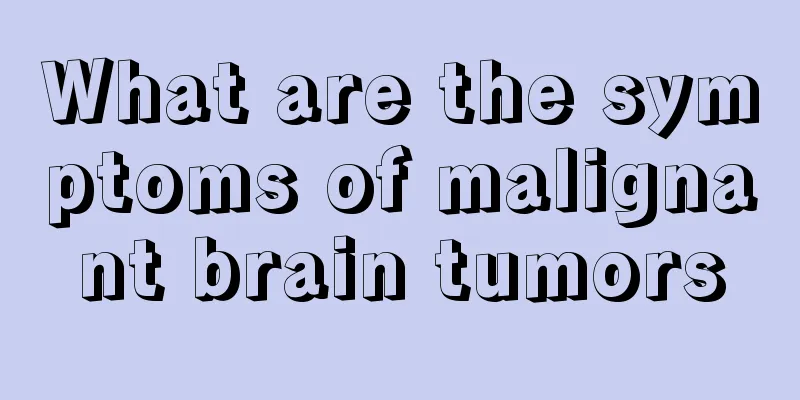What are the symptoms of malignant brain tumors

|
Brain tumor is a serious tumor disease that endangers people's lives. Malignant brain tumor is even more serious. So what are the symptoms of malignant brain tumor? The following experts will introduce the symptoms of malignant brain tumor . 1. Focal symptoms depend on the location of the tumor. Various symptoms and syndromes may occur. Here we can only briefly introduce the symptoms of the more common malignant brain tumors caused by brain tumors in various locations. Central area tumors: including the precentral gyrus of the frontal lobe and the postcentral gyrus of the parietal lobe and their adjacent parts. There is contralateral central facial paralysis, monoplegia or hemiplegia and hemisensory impairment. If the dominant hemisphere is affected, motor aphasia may occur. If there is an epileptic seizure, it is more common with generalized seizures. After the seizure, the limbs may be temporarily paralyzed, which is called Todd numbness. 2. Frontal lobe tumor: The symptoms of this malignant brain tumor are mainly mental symptoms, such as apathy, not caring about surrounding affairs, euphoria, and lack of initiative. Memory, attention, understanding and judgment decline, intelligence declines, and people do not pay attention to their own cleanliness. They are often unaware of their urination and defecation. Typical cases include strong grip reflex and groping movements. Epileptic seizures are also more common in the whole body. The dominant hemisphere has motor aphasia and agraphia. Lesions at the base of the frontal lobe can cause loss of smell and decreased vision. 3. Parietal lobe tumor: mainly sensory impairment, characterized by impairment of positioning sensation and sensory discrimination. The patient cannot distinguish the shape, size, weight, and texture of objects by touch. The positional sense of the limbs is also reduced or disappeared, so there may be sensory ataxia. Lesions on the dominant side may cause acalculia, alexia, agraphia, self-awareness, and loss of orientation ability such as direction and position. As a result, patients often get lost. Epileptic seizures are often preceded by sensory symptoms. When the tumor involves the paracentral lobule of the parietal lobe, there may be bilateral lower limb spastic paralysis and urinary retention. 4. Increased intracranial pressure. The symptoms of this malignant brain tumor include intermittent headaches that gradually intensify, which occur more often in the early morning when waking up from sleep and at night. Most of the sites are in the two temples, and may involve the back of the occipital and the eye sockets. The headache worsens when coughing, exerting force, sneezing, leaning over, lowering the head, etc. Severe headaches may be accompanied by vomiting, which is often projectile. In severe cases, the patient cannot eat and vomits after eating, which may affect the patient's nutritional status. Papilledema is an objective sign of increased intracranial pressure. If present, it has great diagnostic value. In addition, increased intracranial pressure can also cause palsy of the abducens nerves of both eyes, diplopia, decreased vision, blackouts, dizziness, cataplexy, and impaired consciousness. 5. Corpus callosum tumor: characterized by progressive dementia. Tumors in the middle of the corpus callosum invade the motor and sensory cortices on both sides, causing bilateral motor and sensory impairment, with the lower limbs being more severe than the upper limbs. Tumors in the posterior part of the corpus callosum can cause symptoms similar to those in the pineal region due to compression of the quadrigeminal body, including anisocoria, loss of light and accommodation reactions, and inability of both eyes to look upward, which is called Parinaud syndrome. Since the cerebral aqueduct is easily damaged, symptoms of hydrocephalus and increased intracranial pressure are also more likely to occur. The above content is the symptoms of malignant brain tumors introduced by experts. Everyone should pay attention. I hope the above content can be helpful to you. If you have other questions about the symptoms of malignant brain tumors, please consult online experts and they will give you detailed answers. For more information, please visit the brain cancer special topic at http://www..com.cn/zhongliu/na/ or consult an expert for free. The expert will then give a detailed answer based on the patient's specific situation. |
<<: Experts introduce surgical treatment methods for brain tumors
>>: Experts tell you what is a benign brain tumor
Recommend
What can be checked by taking an X-ray
With the advancement of science and technology, t...
What to do with high uric acid and gout, five methods of effective treatment
Gout patients usually have high uric acid levels....
What should liver cancer patients pay attention to in their diet? Liver cancer patients should pay attention to these matters in their diet
The harm of liver cancer is quite serious, so we ...
How to eat Rana oil correctly
Some friends may not know much about Rana affine ...
Is glioma related to genetics?
It is unfortunate to have a glioma patient in a f...
What are the causes of ovarian cancer
The specific causes of ovarian cancer are not ver...
What diseases does the Acupuncture Department treat?
Acupuncture is a common treatment method. In dail...
What are the harms of long-term use of tooth cleaning powder to teeth
With the improvement of living standards, people ...
What medicine should I take for impotence
Impotence is a disease that only occurs in men. T...
What are the classifications of thyroid cancer? Thyroid cancer is generally divided into these 4 types
There are many types of thyroid cancer, the most ...
Effect of high-efficiency scale remover
Scale is easily hidden in many places in life, bu...
Can pituitary tumors be completely cured?
Most people don't know about pituitary tumors...
How to identify melanoma
Melanoma is so scary, how should we guard against...
What are the effects of Houttuynia cordata and snow pear stew
Houttuynia cordata is a common herb that can brin...
Breathing tips for breaststroke
In recent years, swimming has become an increasin...









